Kasugbong Samar
initiates regional MSQRT assembly
By GINA DEAN-RAGUDO, Samar News.com
March 14, 2011
 CALBAYOG CITY –
Among the many areas in the country that the Ateneo Human Rights
Center (AHRC) has visited, it was able to establish 3 Multi-Sectoral
Quick Reaction Teams (MSQRT) in Eastern Visayas namely, Darangpan
(Northern Samar), Kaugop (Leyte) and Kasugbong (Samar) which was
recently launched through Samar Partnership for Peace and Development
(SPPADE).
CALBAYOG CITY –
Among the many areas in the country that the Ateneo Human Rights
Center (AHRC) has visited, it was able to establish 3 Multi-Sectoral
Quick Reaction Teams (MSQRT) in Eastern Visayas namely, Darangpan
(Northern Samar), Kaugop (Leyte) and Kasugbong (Samar) which was
recently launched through Samar Partnership for Peace and Development
(SPPADE).
In the 1st Regional
MSQRT Assembly on March 8, 2011 at Tony’s Kitchen, Catbalogan City,
AHRC representative, Atty. Khrizna Gomez said that human rights
situation in the Philippines became an issue in recent years and
escalated between 2006-2007 with reports of rising number of victims
of extra-judicial killings, prompting the United Nations to take
action. The UN Special Rapporteur on extrajudicial summary or
arbitrary executions, Philip Alston, visited the country in 2007 and
subsequently filed a report with recommendations on how to address the
situation. His report was supported by the Melo Commission (created by
Arroyo administration) though it did not show the Melo Report to him.
The Supreme Court
through its training arm – the Philippine Judicial Academy organized a
national forum attended by different experts in the society which
includes the government, academe, NGOs and other civil society groups
to talk about the issue. The highest tribunal subsequently issued a
Writ of Amparo and Writ of Habeas Data followed by the creation of
human rights offices in the Arm Forces of the Philippines (AFP) and
Philippine National Police (PNP). Eventually a multi-sectoral skills
building workshop on ELKs and EDs were conducted and the group
identified the problem which lies in the prosecution of cases.
Realizing that the predicament is so broad, highly domicile and
politically sensitive, the group finally decided to initiate a multi-sectoral
approach, said Gomez.
In pursuing its goals,
AHRC continuously work closely with various government, the academe,
non-government organizations (NGOs), grassroots organizations, and
other civil society groups. Maintained alliances with the national and
international organizations whose operations and expertise are
relevant to the respective sectors served by the center; and involved
in establishing MSQRTs which serves as one-stop assistance centers
where victims and/or their families can report human rights
violations, specifically violations of civil and political rights;
request immediate investigation; seek legal advice and assistance; and
request witness protection.
Gomez stressed that
the essence of MSQRT is to address the needs of Extra-Legal Killings (ELK) and Enforced Disappearances (ED) victims by
means of a coordinative mechanism between security forces, CSOs,
church, media, academe, government, NGOs and law students. Since it is
a “victim-centered” mechanism it includes psychosocial counseling and
other forms of assistance or services intended for the victims.
For Samar Province,
PSupt. Maximo Manicani suggested that the next MSQRT Assembly should
be held in Calbayog City or Gandara as reports revealed that human
rights violations and other forms of criminalities mostly occurred in
said places compared to Catbalogan and Tacloban Cities. He also
recommended that politicians should be requested to attend since ELKs
and EDs are allegedly politically related.
Kasugbong convenors
Emy Calagos-Bonifacio and Fr. Cesar Aculan has yet to decide on the
proposition.
On the other hand,
participating agencies such as the Commission on Human Rights,
Department of Interior and Local Government (DILG), Criminal
Investigation and Detection Group (CIDG), National Bureau of
Investigation (NBI), Samar and Eastern Samar Provincial and Catbalogan
City Police Offices, 8th Infantry Division of the Philippine Army,
City Social Welfare and Development Office, Technical Education and
Skills Development Authority (TESDA), Urban Poor Sector, Kaisahan,
Katungod han Samareña Foundation Incorporated (KSFI) and the media
expressed their commitments to Kasugbong Samar MSQRT.